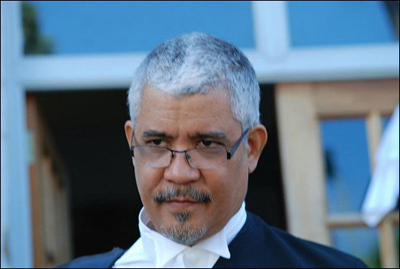Three senior Trinidad and Tobago attorneys will this morning be representing Cedric Richardson at the Caribbean Court of Justice (CCJ) hearing into the appeal of the constitutionality of the two-term presidential limit.
This newspaper understands that Douglas Mendes, SC, Devesh Maharaj and Associates and Kandace Bharath will appear on behalf of Richardson, of Laing Avenue, Georgetown. Questions will be raised about Richardson’s ability to mobilise top flight legal representation for this matter.
The People’s Progressive Party has distanced itself from Richardson who has kept himself away from any public scrutiny.
According to the schedule, the case will be heard in Court Room 1 via video at 10 am.
This newspaper was told that Solicitor General Kim Kyte and Barbadian Queen’s Counsel Ralph Thorne and Hal Gollop are expected to travel to Trinidad to present the case for Guyana.
The appeal was filed by Attorney General Basil Williams and then Speaker of the National Assembly Raphael Trotman who were named in a court action filed by Richardson.
The appeal is against a majority judgment by the Guyana Court of Appeal, upholding the 2015 ruling by former acting Chief Justice Ian Chang that the two-term presidential limit is unconstitutional.
Last February, in a landmark ruling former acting Chancellor Carl Singh, and now retired Justice B S Roy dismissed the state’s appeal to Justice Chang’s ruling. Dissenting, was then acting Chief Justice Yonette Cummings-Edwards.
Richardson filed the constitutional motion in the court months before the 2015 elections. He challenged the restriction created by amendments to Article 90 of the Constitution that were enacted in 2001 after the bipartisan Constitution reform process.
On July 9, 2015, Justice Chang ruled that the presidential term-limit was unconstitutional without the approval of the people through a referendum. The amendments to Article 90 of the Constitution had seen the insertion of two clauses to allow for re-election only once.
Justice Chang’s ruling had paved the way for two-term president Bharrat Jagdeo to seek re-election if he so desired.
Jagdeo had repeatedly distanced himself from the case and had publicly said that he had no intention of running for office again. However, he is now the Opposition Leader and has been elected as General Secretary of the PPP/C. It is that party’s General Secretary who has traditionally been its presidential nominee.
Justice Singh, in delivering the ruling, had expressed the view that the decision on the term limits rests with the people via a referendum and not the National Assembly.
Article 90 of the Constitution states at Clause 2(a) that a person elected as president after the year 2000 “is eligible for re-election only once” and at Clause (3) that a person who acceded to the presidency after the year 2000 and served therein on a single occasion for not less than such period as may be determined by the National Assembly “is eligible for election as president only once.”
Among other things, Justice Singh had said that changes to the features of the article could only be done via referendum; that is “by the people themselves”.
He said that when the Act No 17 of 2000 “altered” the provisions of Article 90 resulting in an increase in the number and categories of disqualified persons who the political parties might have considered as their candidate, that “effectively suppressed the right of the people to freely choose those persons whom they feel should represent them”.
He said that this right of the people to choose is now controlled by the National Assembly.





